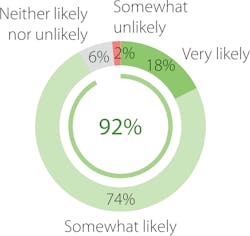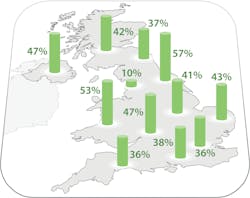Can US Providers Learn from UK Providers’ Sustainable Product Labeling Intentions?
S&T Iskratel recently shared survey results about adopting energy-efficiency labeling across all broadband-access equipment and solutions. The survey1 included 250 business professionals with key roles in the decision-making process and employed by large and small fiber-broadband telecommunications operators in the UK. The respondents include senior-level managers and professionals (60%), directors (25%), and business owners and C-suite (15%).
Almost 99% of the companies measured sustainability footprints of their products and services. Slightly more do so for customer premises equipment such as home gateways, ONTs, and Wi-Fi routers. A significant majority (92%) expect to have a carbon-emission strategy for their company over the next year. (See Figure 1.)
Interestingly, only 18% shared that they planned to act on this over the next year and answered the question as “very likely”. The lukewarm 74% response could be interpreted in two ways: either that having a strategy in place is perceived as pressure from stakeholders, or that immediate environmental actions are preferred and companies will commit resources on working on a strategy.
Not surprisingly, most respondents (97%) favor publishing data about energy efficiency of products and solutions. One key finding regarded 30-year-old respondents are more likely (98%) to advocate for disclosure of this data than 50-year-olds (95%). While not a huge difference, S&T Iskratel finds this an encouraging indication that younger decision-makers place a greater priority on disclosure and transparency.
There is one interesting contradiction from the survey results. When asked “Are you willing to adopt energy-efficiency labeling for your new broadband products/solutions?”, only 63% of respondents answered “yes”. This is in direct contrast with the views exhibited in the question “Do you think all companies should publish data about their energy efficiency?”. (See Figure 2.)
Of the 36% that shared they were not willing to adopt labeling, 7% believed they will in the future. However, as many as 29% were resolute that they will not adopt it, even in the future.
When asked what is most important to the respondents when choosing a broadband services provider, they provided multiple answers as shown in Figure 3. Service and support ranked the highest. The importance of sustainability policy ranked third with 41% of respondents indicating it as a decisive factor. The sustainability question varied by age. Younger respondents ranked it as more important; older respondents found it a lower priority.
REFERENCES AND NOTES
1. https://www.iskratel.com/en/resources/case-studies/the-first-uk-telecom-sustainability-survey
About the Author
Tomo Bogataj
Head of Broadband Marketing, S&T Iskratel
Tomo Bogataj is head of broadband marketing at S&T Iskratel. He has more than 20 years’ experience in telecommunications and is actively contributing to S&T Iskratel’s environmental sustainability strategy.
For more information, please email [email protected] or visit https://www.iskratel.com/en/solutions/broadband. You can also follow them on LinkedIn: https://www.linkedin.com/company/sntiskratel/.






